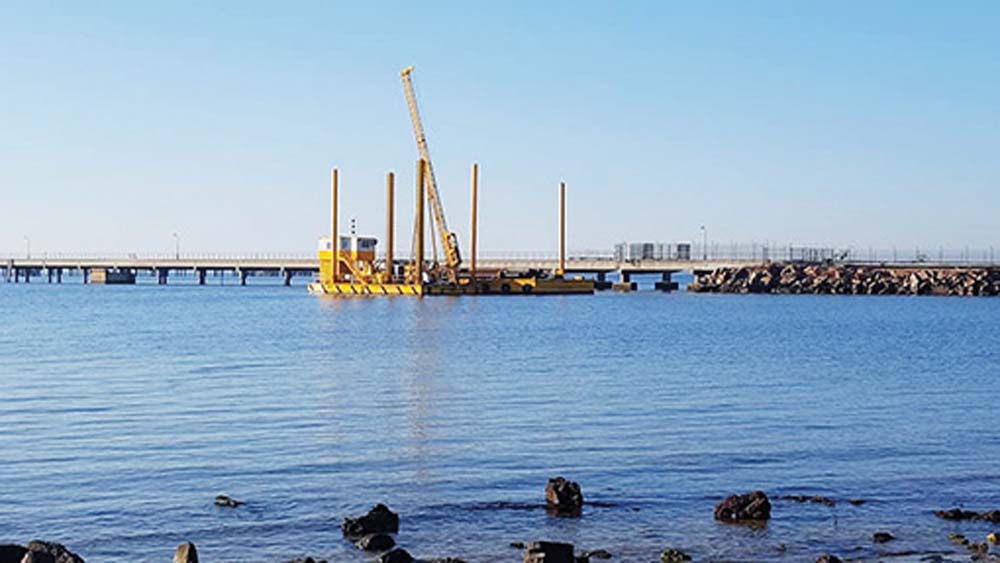
STATE planning minister Richard Wynne is expected to decide before the end of the month on the need for power company AGL to undertake full environmental studies into the effects of a floating gas terminal at Crib Point.
AGL and APA Transmission – which, if approved, will build a gas pipeline from Crib Point to Pakenham – submitted details of their proposals to Mr Wynne last Tuesday (11 September).
Later that night Mornington Peninsula Shire called for “a state government-run transparent consultation process [into the importation of gas] that includes examining environmental effects and problems associated with the proposed 60 kilometre pipeline through agricultural land”.
The motion by Cr David Gill adopted unanimously by council, said the shire “shares community concerns” about the AGL’s gas import plan.
State Liberal MP for Hastings Neale Burgess and his federal Liberal colleague Flinders MP Greg Hunt have both said they oppose the gas terminal at Crib Point. The project for the 300 metre long floating storage and regasification unit (FSRU) – which AGL says is yet to be approved by its board – must also get the go ahead from the federal government.
On 8 August Ports Minister Luke Donnellan told state parliament he supports “the proposal to bring gas in through the port of Hastings” and gave assurances “the proposal will go through a full environment effects statement process” (“Government support for gas plan” The News 22/8/18).
The lodging of documents by AGL and APA with Mr Wynne has seen an increase in efforts by Save Westernport campaigners to have the project scrapped.
Spurred on by the imminent decision, Save Westernport is urging its supporters to seek publicity, encourage people to sign an online petition (which also “automatically emails” Mr Wynne) and hold up banners outside “community consultation sessions” held by AGL (7-9pm Tuesday 18 September at Hastings Hall, 3 High Street Hastings and 7-9pm Tuesday 25 September at Crib Point Community Hall, 7 Park Road).
Cr Gill said he hoped the state government will not allow the applications by AGL and APA “to proceed without a thorough investigation of all ramifications involved in granting a permit”.
“There are safety and pollution risks involved in the regasification process of imported liquefied gas on moored boats and also the discharge of chlorine into the United Nations environmentally-listed Western Port that haven’t been properly addressed,” Cr Gill told The News last week.
“The close population of Crib Point are alarmed that the risk of explosion assessment is not available or independently verified. The 60 kilometre pipeline will run through thousands of hectares of prime agricultural and green wedge rural land putting the viability of farmers and essential food bowl products in jeopardy.”
AGL’s media relations manager Garry West said announcing that the referrals for a gas import jetty and the Pakenham pipeline had been sent to Mr Wynne “is part of our commitment to ongoing community consultation”.
Phaedra Deckart, AGL’s general manager of energy supply and origination, said the approach to Mr Wynne “is just one step in a long planning assessment process”.
“In response to concerns raised by Environment Victoria and the local community the referrals have been submitted together to ensure the full impacts of the combined projects are considered,” she said.
“The referrals provide a fulsome evaluation of the potential direct, indirect and cumulative impacts of the projects, in order to enable a comprehensive and integrated assessment of the projects.”
Ms Deckart said it was “important” to consider the fundamental need for the projects.
“The project will create a new gas supply source, which will have the effect of providing much needed security of supply and placing downward pressure on prices,” she said.
“Forecast gas supply shortfalls raise the prospect of higher and more volatile prices for Australian customers, reflecting competition for scarcer domestic gas supplies.
“Gas can and is playing a critical role in providing stability to the electricity market and providing firm and flexible back-up electricity generation.”
First published in the Southern Peninsula News – 18 September 2018

